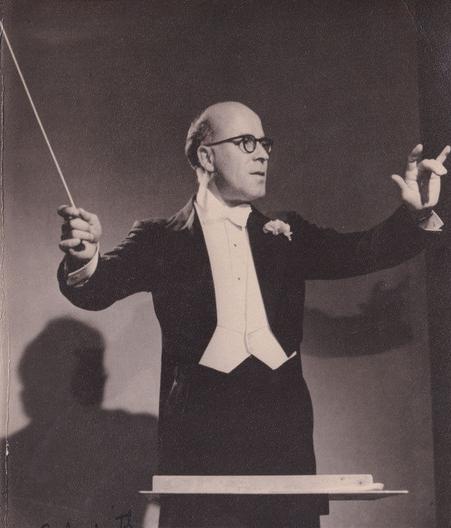LEGENDS OF
LIGHT MUSIC
Leighton Lucas

A MUSICAL
ALL-ROUNDER: LEIGHTON LUCAS
(1903-1982)
By Philip L. Scowcroft
Leighton Lucas,
born in London on 5 January 1903
(his Canadian-born father
Clarence Lucas published
drawing-room ballads), was
musically self-taught, yet he
later became a Professor at the
Royal Academy of Music and also
lectured elsewhere, even on
radio. He had experience, as a
dancer, with Diaghilev’s
Ballet Russe between 1918 and
1921 and then as a conductor with
the Birmingham Repertory Theatre
(1922-3) and in a performance of
Rutland Boughton’s opera
"The Immortal Hour" in
1923. He later conducted for the
ballet (as we shall see, he also
composed for it) and, after war
service in the RAF, formed his
own Leighton Lucas Orchestra to
give concerts on the BBC –
perhaps elsewhere – of
unfamiliar, sometimes
"modern", but always
approachable, music and often
French music. I enjoyed these
during my teens and they expanded
my own listening. They combined
serious and light music as the
following example from 29 March
1949, transmitted as "A
Serenade" on the Third (yes,
Third) Programme.
Overture: The
Cambridge Ode (Boyce, arr.
Constant Lambert); Cantata by
Carissimi; Gymnopeidie No. 1
(Satie, arr. Debussy); Four Songs
(Sleep, Good Ale, Take O Take
Those Lips Away andYarmouth Fair)
(Warlock); Habanera (Chabrier);
Lonely Waters (Mocran); Song of
the Sicilian Cart-Driver (Anon.);
Three Songs of The Roman
Countryside (Anon.); Kamarinskaya
(Glinka).
No ego trip there
as there is nothing by Lucas
himself. More recently I have
heard a recording (made from a
78) of the LLO performing on the
BBC (1955) Horace Dann’s
stirringly Elgarian concert
marchWorcester Beacon. He was
always ready to try something new
or less well known.
When we look at
Lucas’ orchestral (and
other) pieces we have to admit
that several are
"serious", though
invariably accessible: a Litany
(for strings), Birthday
Variations (1970), three masses,
many part songs, Chaconne in C
Sharp Minor and many concerted
works, a Concerto for clarinet, a
Concertino for cello, Prelude,
Aria and Finale for viola
d’amore, Concert ChampÍtre
for violin, theSinfonia Brevis
for horn and eleven instruments
and chamber music, most notably a
String Trio and a Piano Quartet.
His works inclined towards
brevity and were never written in
a "groove" as these and
other titles show.
There were lighter
works in orchestral and
instrumental categories. In the
former there were Ballet de la
Reine (for strings), Suite
Francaise (1940) and
L’Europe Galante, after
Campra (1939), a fruit of his
preoccupation with French music
old and new, even a few pieces of
"library music" titles
being Eastern Court,
Princesses’ Dance and Snake
Charmer. Instrumental miniatures
included Meditation for cello and
piano, Aubade for horn, bassoon
and piano, Soliloquy and
Tristesse for viola and piano,
Orientalefor bassoon and piano,
Disquisition for two cellos and
piano duet, Three Dances for
Three (two harps and oboe,
clearly the Goossens family) and
for brass band, Spring Song and A
Waltz Overture.
But we have so far
only scratched the surface of
Lucas’ light music, quite a
lot of which was in the fields of
ballet and film music. His
interest in ballet was reflected
by his scores for The Wolf’s
Ride(1935), Death in Adagio
(after Domenico Scarlatti)
(1938), The Horses (1945-6) and
Tam O’Shanter(composed in
1972-3 but never staged). He
wrote for dozens of films –
many of them pre-war, wartime and
post-war documentaries, but a
number of feature length issues
starting with the wartime
propaganda film "Target for
Tonight" (1942), very
popular in its time, I remember,
"Portrait of Clare" and
"The Dam Busters"
(1954). Admittedly he did not
write the most famous part of
that film’s music, which is
Eric Coates’
"titles" march, bits of
which are recalled later in the
film, most of all at the
climactic moment when the MŲhne
Dam collapses.
Lucas showed a few
years later that he could write
stirring marches of his own, for
the films "Yangtse
Incident" and "Ice Cold
in Alex", which respectively
yielded the marches The Amethyst
and The Road to Alex
("Alex" also had a
Romance published separately).
Lucas also wrote for BBC Radio
quite prolifically – plays,
features and the serial
"Just William",
remembered with affection by the
writer from his teenage years
(1940s).
One is tempted to
compare Lucas with Constant
Lambert. Both were enterprising
conductors, both had a great
interest in the ballet, both
wrote film music. Lambert had a
sadly shorter life (Lucas lived
until 1 November 1982) and
achieved more in the ballet field
but less in writing for the
films. Perhaps, too, his
achievement in composition
generally was more memorable, if
less extensive. But Lucas’
work deserves recall and indeed
modest revival of the music.
This article
originally appeared in the Robert
Farnon Society’s magazine
"Journal Into Melody"
in September 2009.
|